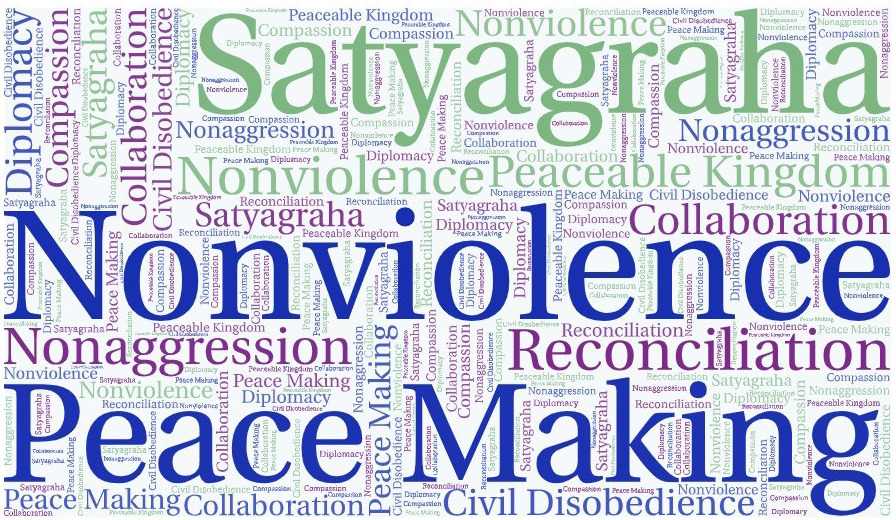I’ve been thinking a lot lately about our children. Of late our news outlets and community conversations have in so many ways turned to the welfare of our children whether it be by opening up vaccinations to a wider array of our young, ongoing conversation about comprehensive sex education in our public schools, or ways to curb the pandemic of violence that continues to plague the lives of so many. All of this now sits front and center as I consider this month’s touchstone ministry theme on “Non-Violence”. And that introduced me to a story which has taken up the core of my reflections, first told by my friend and colleague Patrick O’Neall and again adapted by another friend, Pat Hoertdoerfer.
Among the most accomplished and fabled tribes of Africa, no tribe was considered to have warriors more fearsome or more intelligent than the mighty Maasai. It is perhaps surprising then to learn the traditional greeting that passed between Maasai warriors. “Kasserian ingera” one would always say to another. It means “and how are the children?”
It is still the traditional greeting among the Maasai, acknowledging the high value that the Maasai always place on their children’s well-being. Even warriors with no children of their own would always give the traditional answer, “all the children are well.” Meaning, of course, that peace and safety prevail, that the priorities of protecting the young, the powerless, are in place, that Maasai society has not forgotten its reasons for being, its proper functions and responsibilities. “All the children are well” means that life is good. It means that the daily struggles of existence do not preclude proper caring for their young.
I wonder how it might affect our consciousness of our own children’s welfare if in our culture we took to greeting each other with this daily question: “and how are the children?” I wonder if we heard that question and passed it along to each other a dozen times a day, if it would begin to make a difference in the reality of how children are thought of or cared for in our own country?
I wonder if every adult among us, parent and non-parent alike, an equal weight for the daily care and protection of all the children in our community, in our town and state, in our country. I wonder if we could truly say without any hesitation, “the children are well, yes, all the children are well.”
What would it be like … if religious leaders began every worship service by answering the question: “and how are the children?” If teachers began every class by answering the question: “and how are the children?” If every town leader had to answer the same question at the beginning of every meeting: “and how are the children? are they all well?” If every business leader and corporate executive had to answer the same question at the beginning of every workday: “and how are the children? Are they all well?” Wouldn’t it be interesting to hear their answers? What would it be like? I wonder . . . I wonder . . ..
Let’s begin here and greet members and friends in our Unitarian Universalist Congregation with and how are the children? And before we can respond to one another “all the children are well”, what actions must we take in this congregation? In our community? In our state? In our Unitarian Universalist Association of Congregations? In our country?
And how are the children? Working together, may all our children be well. (Adapted by Pat Hoertdoerfer from an excerpt of a speech by Rev. Dr. Patrick T. O’Neill Source: https://www.uua.org/worship/words/service/look-to-the-children)
This has given me a new understanding of the ritual we began during the pandemic of offering an “RE Moment” during worship. More than simply being an opportunity to reflect on the programming we offer for children, I have come to understand that at its very core, this “moment” really begins with the question at the heart of Maasai culture. It also reflects the mission of this congregation to provide so many important opportunities for our children and youth here at UUCW, which culminate in our Our Whole Lives (OWL) and Coming of Age Programs. It is the spirit of service and solidarity, play and fellowship of our youth programming. It is at the heart of our Service of Dedication when we pledge our support and responsibility to children and families. It is witnessed to every week by volunteers, teachers, mentors, advisors, and our staff. And I believe that it is the source of hope and memory that resides in those who are raised within this congregation, as they venture into their own lives beyond this community.
This all helps me remember that the basis of working for a more peaceful, hopeful, loving and just world begins with the question “How are the children?”. It is the beginning of non-violence and the heart of community.
As we continue to bear witness to this in what we do in this congregation, may we carry this consciousness into all of the corners of our common living. May it too be a source of inspiration for all you do in the days, months and years before us.

Blessings,
Aaron
